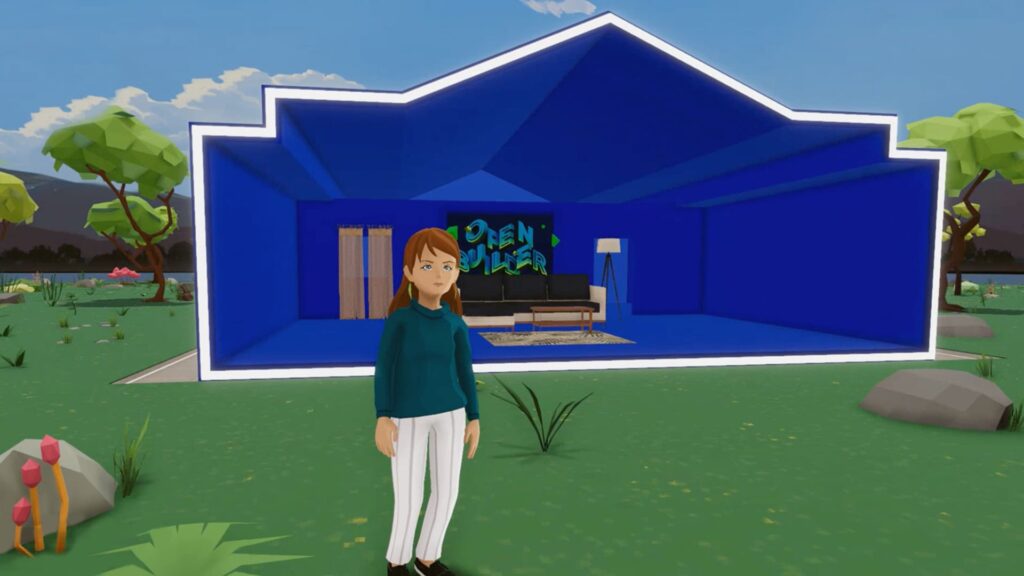Lowe’s Metaverse Open Builder.
Courtesy: Lowe’s
It seems like every company is getting into the metaverse these days. Lowe’s doesn’t want to miss out on the opportunity to use it to help builders imagine projects.
But unlike other retailers that chose a particular virtual platform or game like Fortnite or Roblox, Lowe’s metaverse assets – including free downloads of 500 product assets, including items such as chairs – are available on its own hub.
“It’s all emerging, and it’s all up for exploration,” Lowe’s executive vice president and chief brand and marketing officer Marisa Thalberg told CNBC in an exclusive interview. The retailer decided not to choose one metaverse platform but rather “a kind of an agnostic and kind of democratized approach,” she said.
While other brands have found immediate ways to make money in the metaverse, even on an experimental basis, Thalberg said “this isn’t about immediately jumping in and trying to make an event or immediately commoditizing it.”
Rather, she told CNBC, “our goal really is to take this new frontier and help people use their imaginations and help them make their virtual spaces as exciting and inspirational and enjoyable as their real world spaces. And that’s the only benefit we seek to obtain at this point.”
At least that’s the only stated benefit. As the first major home improvement retailer to enter the metaverse and make its applicable assets available for free, no doubt a key goal is watching consumer behavior to eventually capitalize on the opportunity that might exist. The assets are based on real products the company currently sells online and in its stores.
Lowe’s Metaverse Open Builder.
Courtesy: Lowe’s
Analysts see a big breakthrough coming for the metaverse. By 2026, a quarter of consumers will spend at least one hour per day in the metaverse, said consulting and research firm Gartner estimates. Morgan Stanley Estimates the total addressable market for advertising and e-commerce opportunities could be worth $8.3 trillion in the metaverse, with $697 billion in home and home related spending. The firm lists walking through “home renovation plans” as an example.
“Just last year, it was estimated that about $100 billion were spent on virtual goods inside gaming platforms. That doesn’t even include NFTs,” said Futures Intelligence Group CEO and chief metaverse officer Cathy Hackl.
Metaverse participants have, in some cases, already paid thousands of dollars for unique non-fungible tokens to outfit aviators from luxury and fashion brands like Gucci, Balenciaga, Dolce & Gabbana and Ralph Lauren. Gucci saw 19 million visitors to its Gucci Garden on Roblox. Dolce & Gabbana sold an NFT called “The Glass Suit,” with an accompanying physical garment, for over $1 million.
For its part, Lowe’s is releasing a free, limited NFT collection of boots, hardhats and other related accessories for builders on the Decentraland platform to the first 1,000 participants.
Seemantini Godbole, Lowe’s executive vice president and chief information officer, told CNBC in an exclusive interview the retailer is applying many of the principles he currently uses for shoppers for this metaverse project.
“What we have noticed in our current mediums like Lowes.com and in our stores… people like to experiment and while they’re shopping and getting inspired they like to put things together in the virtual world before they start their project,” she said. “It’s the same idea for the metaverse. That you want them to experiment, feel and understand how it’s going to look before they start the project in the real world.”
Lowe’s Metaverse Open Builder.
Courtesy: Lowe’s
Godbole said many of these metaverse assets had already been created as 3D digital versions of physical products available for purchase, to help online shoppers visualize the real-life dimensions and features. Lowe’s is already using virtual and augmented reality technology to allow shoppers to design an entire kitchen online or map their home’s floor plan using their smartphone as examples.
“There is just a huge appetite from our customers to use emerging technology” like the VR and AR tools Godbole said. “We are applying some of those lessons in the metaverse.”
Right now, Lowe’s isn’t offering a physical good with the purchase of a virtual one, or any link back to its website from any metaverse platforms, Godbole said. But that could change.
“In the future, we could absolutely think about, how do all these different things link, and make sure that [metaverse users] are able to shop these items on Lowe’s dot com or in our stores,” she said.
Thalberg acknowledges that the typical metaverse participant “skews really young,” likely younger than the typical Lowe’s shopper or homeowner today.
“But if you look at kids who’ve used platforms like Minecraft and Roblox, a lot of what they do there, is fascinatingly enough, build and design. This idea of being able to build and decorate and design and improve is kind of core to how these spaces are emerging,” she said. “And so if we catch them young, that’s great, but we see a real utility too, as we look to a huge wave of millennial new homeowners who aren’t afraid of technology.”
.

